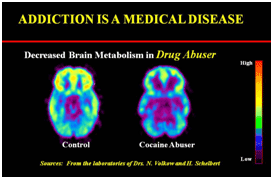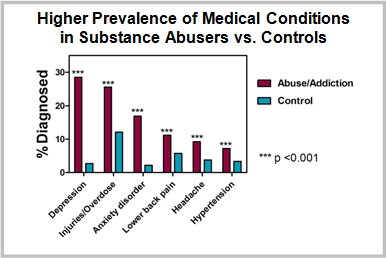“From the day I started using, I never stopped. Within one week I had gone from snorting heroin to shooting it. Within one month I was addicted and going through all my money. I sold everything of value that I owned and eventually everything that my mother owned. Within one year, I had lost everything.” -‘Jeremy’ (whose name has been changed)
I'm writing this to clear up the misconceptions that stem from this article. Heroin has become the biggest drug epidemic since cocaine/crack in the 70's on. I would wager that the person who wrote that article, and other who say that, “addiction is not a disease” do not understand the definition of the word disease. According to Webster’s, disease is defined by, “a condition of the living animal or plant body or of one of its parts that impairs normal functioning and is typically manifested by distinguishing signs and symptoms: sickness, malady infectious diseases a rare genetic disease heart disease.” So when you said,
"Let me take you into a cancer ward, then try telling me you also have a disease,"
I can see you might know what the word disease means, but you don't understand it:
Heroine and addiction impair the normal functioning and typically manifests by distinguishing signs and symptoms. Are we clear now? No? Let’s say hypothetically you still disagree with me, well that’s fine. You can argue with the NIH, too. According to the National Institute of Health, “Combined biological, epidemiological, and social science discoveries of the last 3 decades have given us a detailed understanding of the risks, mechanisms, and consequences of drug abuse and addiction.”
Your lack of empathy does NOT change the science nor does it change the facts about addiction. You see, you if you do not see it this way, that’s OK, but just know you’re wrong. Formerly, addiction was considered a moral failing, a lack of will over one’s actions. The mid 70's were the “heyday” of many drugs of abuse, including nicotine, marijuana, and amphetamines. Had these trends continued rather than shift downward over the last decade, we would today see exponentially higher healthcare and education costs, unemployment, and crime. Recent scientific advances have revolutionized our understanding of addiction as a chronic, relapsing disease and not a moral failure. Now, if you can disprove this with your own studies, facts instead of strong feelings, than I am sure that the NIH would love to rescind their position and stances on the heroin epidemic.
Above is a graphic that shows the brain scans of an addict and a control brain scan on the left. There is visual evidence.
Is addiction a disease? Some people may try to say otherwise, but addiction is in fact. Think about how addiction rewires your brain to prioritize drugs over everything else on Maslows hierarchy of needs. It isn't hard to understand how addiction fits the definition of disease, as ignoring these needs are a symptom of addiction. According to the NIH, Genes account for about 50 percent of a person’s risk of becoming addicted, and environmental factors influence the effect of these genes—an area of research called epigenetics. Progress in genetics/ epigenetics research will lead to more refined prevention and treatment interventions targeted to individual risk or to modifiable environmental influences.
When you say, addiction is a form of someone seeking pity, it really showcases your lack of empathy for other humans. The external signs of hard drug abuse stem from various medical conditions leading to drug abuse an addiction, more often than not we are treating the symptoms of drug abuse, instead of the actual problem. The underlying mental health issues are something we need to examine, and help people instead of casting judgement. So we should all work together to help fight against heroin and the adverse effects instead of trying to call out people on their “pity party.”
Beyond helping victims of addiction, we can also begin to hold pharmaceutical companies producing drugs that segue into drug abuse accountable. (and also the drug dealers selling the heroin). Which Prescription Drugs Are Commonly Abused? According to the National Institute on Drug Abuse, the three classes of prescription drugs that are often abused include: Opioids used to treat pain Central nervous system (CNS) depressants, such as benzodiazepines (Xanax, Valium, Ativan, Klonopin), used to treat anxiety and sleep disorders stimulants, such as amphetamine and dextroamphetamine (Adderall) or methylphenidate (Concerta, Daytrana, Methylin, Ritalin) used to treat attention deficit disorder and narcolepsy (a sleep disorder). Note that the trends in mental illness and addiction have a direct correlation and the drugs being prescribed for the mental illnesses that go along with addiction are the same drugs being abused and calling drug abuse in the first place. Once a person’s prescription for pain medication (which can take years) ends then they still have the addiction in place, it is logical to assume they’ll go looking for the next best thing. The progress is moving forward with Ohio suing big pharmaceutical companies for once and holding them accountable, "We believe the evidence will also show that these companies got thousands and thousands of Ohioans — our friends, our family members, our co-workers, our kids — addicted to opioid pain medications,” Attorney General Mike DeWine declared. “These drug manufacturers knew what they were doing was wrong, but they continued to do it anyway.”
How can we help these people? Try empathy. Try reaching out to your friends. Just be a good human. You won’t be able to save everyone, and the person/people you’re trying to help might not want it, and will reject your offers for help. You have to be a strong person to deal with that, and frankly, I’ve seen firsthand how addiction and hard drugs can tear a family apart.-it is not pretty. When you’re dealing with some who is struggling with addiction you must keep in mind that their brain is currently wired differently than yours. You must understand the underlying psychological issues that are behind the drug abuse too. It’s so much easier to say, “Stop trying to get me to pity you,” because that requires less work than actually taking the time to care. If you don’t believe that drug addiction is a disease, than that’s on you for not taking the time to research it. The sooner more people educate themselves on addiction and caring for those with the disease then we can really start helping people and saving lives, because this is people’s lives we are dealing with, not just news articles or stories. I challenge you to be open minded instead of buying into the counter culture- and get educated, be empathetic, and know the facts before you pass judgement on someone who you do not understand.
























